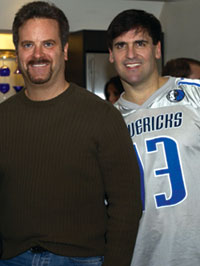LANDMARK STATUS
2929 Entertainment and the future of the Landmark theater chain.
By Anne Thompson.
 |
| Todd Wagner and Mark Cuban. |
Landmark Theaters was purchased in September 2003 by Dallas-based dot-com billionaires Mark Cuban and Todd Wagner (owners of the Dallas Mavericks and the high-definition television network HDNet), who are busy building a vertical entertainment empire. Wagner’s 2929 Entertainment produces films, such as Godsend and the Steven Soderbergh production Criminal, and oversees the digital production house HDNet Films, specialty film distributor Magnolia Pictures (Capturing the Friedmans) and Landmark.
Believers in a “ready, aim, shoot” philosophy, these high-tech entrepreneurs are poised to stay one step ahead of the rapidly approaching digital entertainment future by using their new-technology savvy to nimbly outmaneuver Hollywood, cumbersomely stuck in its out-dated economic models and fear of digital technology and piracy. “This part of the movie business gives us that flexibility to take a movie and put it in a theater or sell a DVD or put it on TV at the same time, in an experimental way,” says Wagner. “Where Mark and I have some advantages is that we know technology, and we are not afraid to leverage it where appropriate.”
2929’s takeover of Landmark exemplifies the stresses and strains that come when emerging technology pushes a mature industry into changing its structure. Cuban’s gamble on high-definition television is already paying off, as burgeoning sales of HD television sets are creating increased demand for digital programming. Wagner plans to equip Landmark with one high-definition digital screen per theater by year’s end and to run digital TV commercials before movie trailers. He also wants to sell DVDs in theaters.
Landmark is just one small piece of the vertical puzzle that Cuban and Wagner are assembling; the primary focus is building a library of digital content for HDNet, which is, as Wagner stresses, “the sun the planets revolve around.”
HDNet Films, which is run by New York producers Jason Kliot and Joanna Vicente, of Blow Up Pictures and Open City Films, is experimenting with digital production. The HDNet Web site originally claimed that “HDNet Films are available, day and date” with their theatrical release to the television network HDNet Movies. But there is no guarantee — at least for filmmakers — that a film produced by HDNet Films will be picked up by their distribution arm Magnolia, or exhibited by Landmark Theaters, let alone be available through HDNet Movies. Alex Gibney, the producer/director of the documentary Enron: The Rise and Fall, one of three films on HDNet Films’ initial production slate, comments that he had not been told of any such plans to air his film.
It is one thing to create new wealth on the Internet, as Cuban and Wagner did with Broadcast.com. (Wagner turned down an offer to run Yahoo! as chief operating officer in 1999.) It’s another to buy an evolved, mature 30-year-old enterprise like Landmark Theaters and keep it profitable.
Many in the independent film community fear that as Cuban and Wagner reach for the high-tech future, they threaten a cultural resource. “Landmark is essential to the success of independent film right now,” says Dawn Hudson, executive director of the Independent Feature Project, Los Angeles. She cites the documentary hit Spellbound as the sort of small-scale film that needs Landmark’s help. “The studios have such a lock on the major theatrical outlets, that independent distributors are more dependent on Landmark to show and hold these films in theaters.”
If Landmark were to alter its art-house mandate and sophisticated grass-roots community marketing, “it would have more impact on small distributors’ cutting-edge films than on us,” says Gilula, who nonetheless released Bend It Like Beckham, Thirteen and Napoleon Dynamite on Landmark screens. “These theaters are still the most effective at launching these [specialty] movies.”
Sony Pictures Classics partner Tom Bernard says that Landmark is responsible for 30 percent of the box office for specialized films: “A lot of circuits like Regal attempt to do [specialty bookings], but they don’t perform the same as Landmark.”
After Cuban and Wagner acquired the circuit in September 2003, they had a rocky relationship with chief executives Bert Manzari and Paul Richardson, who started with Landmark 30 years ago. They failed to renew their contracts and left the company this May. Both Manzari and Richardson had left the chain once before for a two-year period in 2000 when Silver Cinemas bought Landmark. But after Silver Cinemas fell into bankruptcy and was bought up by Oaktree Captial Management the two returned in 2001 to bring Landmark back into profitability. Richardson also salvaged Landmark’s construction of New York’s Sunshine Theater, which Gilula says has become a success.
Thanks to the strong national staff he has inherited, Wagner believes that he can successfully manage the circuit. He has placed Austin-based Bill Banowsky, president of Magnolia Pictures (The Control Room) in charge of the chain, along with his long-time lieutenant Kevin Park, who also runs Wagner’s Dallas charities.
“Bill Banowsky doesn’t know half of what Bert Manzari has forgotten,” asserts independent distribution veteran Bingham Ray. “What Landmark will become is less scary rather than maintaining what it is. If they fall into the trap of competing with the big chains, they risk blowing off the identity they built with their audience.”
“This is not a cookie-cutter chain,” says Richardson. “These are savvy and aggressive guys. I can’t imagine that they’d spend what they spent to buy Landmark and then change it, alienate the audience and potentially undermine their investment. For Landmark to turn into another version of what the big exhibitors do would be a tragedy.”
VOD CALENDAR


 See the VOD Calendar →
See the VOD Calendar →


